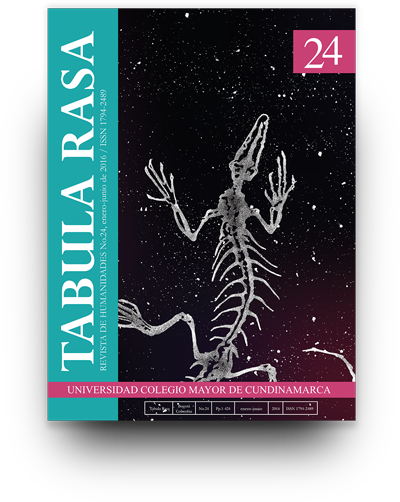Anti-racism and scientific discourses for the masses (1948-1960) : reflections upon “popularization”
Antirracismo y discurso científico para las masas (1948-1960) : reflexiones en torno de la "divulgación"
Show authors biography
By studying historical documents, this article analyzes the relationships between the setting or instance for «popularizing» and «producing» expert knowledge in the case of UNESCO debates on race in the aftermath of World War II. It specifically examines the declarations on race of 1950 and 1951 and a series of articles and documents written around them. This paper is divided into three sections. The first one presents some general aspects of the discussions and the production of expert knowledge on the racial question at UNESCO between 1948-1960, arguing that even though those texts are presented as «popularizing» established knowledge, they often work actively in producing that knowledge. In the third section, we discuss the ways through which certain authority figures are made up through those texts . Finally, some closing remarks are disclosed.
Article visits 109 | PDF visits 58
Downloads
- Authier-Revuz, J. (1984). Hétérogénéité(s) énonciative(s). Langages. 73: 98-111.
- Brattain, M. (2007). Race, Racism, and Antiracism: UNESCO and the Politics of Presenting Science to the Postwar Public. American Historical Review. 112 (5): 1386-1413.
- Cassata, F. (2006). Il Molti, sani e forti. L’eugenetica in Italia. Torino: Bollati Boringhieri.
- Cassata, F. (2008). La difesa della razza. Politica, ideologia e immagine del razzismo fascista. Torino: Einaudi.
- Chiaramonte, J.C. (2013). Investigación, divulgación y polémicas historiográficas. En: Chiaramonte, J. C., Usos políticos de la historia: Lenguaje de clases y revisionismo histórico. Buenos Aires: Sudamericana.
- Comas, J. (1961). 'Scientific' Racism Again? Current Anthropology. 2 (4): 303-340.
- Costa Pinto, L. (1952). Río de Janeiro. El correo de la UNESCO. V (8 y 9): 10.
- Duedahl, P. (2008). Unesco Man: Changing the Concept of Race, 1950-70. American Anthropological Association: 107th Annual Meeting. November 19-23, 2008, San Francisco, California. Retrieved November 23, 2015, from http://vbn.aau.dk/files/61248765/unesco_Man_Paper_Poul_Duedahl.pdf
- Garrett, H. E. (1960). Klineberg's chapter on race and psychology. Mankind Quarterly. 1: 15-22.
- Hazard, A. Q. (2012). Postwar anti-racism. The United States, UNESCO, and “Race”, 1945-1968. New York : Palgrave-Macmillan.
- Jahoda, M. (1960). Radiografía del racista. El Correo de la UNESCO. XIII (10): 25.
- Maingueneau, D. (1999). Éthos, scénographie, incorporation. En : Amossy, R. (Dir.), Images de soi dans le discours. La construction de l’ethos. 75-100. Lausanne-Paris: Delachaux et Niestlé.
- Maio, M. Ch. (2000). The UNESCO Project: Social Sciences and Race Studies in Brazil in the 1950s. Portuguese Literary and Cultural Studies 4/5: 51-64.
- Maio, M. Ch. (2007). Un programme contre le racisme au lendemain de la Seconde Guerre mondiale. 60 ans d'histoire de l'UNESCO. En : Actes du colloque international. 187-196. Paris : UNESCO.
- Mêtreaux, A. (1952). Informe sobre las relaciones raciales en el Brasil. El Correo de la UNESCO. V (8 y 9): 6.
- Métreaux, A. (1953). El hombre lleno de prejuicios es tan patético como su víctima. El Correo de la Unesco. V (8 y 9): 3.
- Métreaux, A. (1960). Panorama de contrastes en América Latina. El Correo de la UNESCO. XIII (10): 21.
- Montagu, A. (1972). Statement on race. An annotated elaboration and exposition of the four statements on race issued by the UNESCO. Londres: Oxford.
- Pêcheux, M. (1978). Las condiciones de producción del discurso. En: Hacia el análisis automático del discurso. 44-61. Madrid, Gredos.
- Poliakov, V. (1960). Antisemitismo vergonzante de hoy. El Correo de la UNESCO. XIII (10): 13.
- Scatizza, P. (2011). Entre el qué, el por qué y la hegemonía de la lógica billikeneana. Algunas reflexiones sobre la difusión de la historia. Nuevo Topo. 8: 121-132.
- Taguieff, P. A. (1992). Du racisme au mot 'race': comment les éliminer?. Mot. 33 (33): 215-239.
- Verón, E. (1987). La palabra adversativa. En: AA.VV. El discurso político. 11-26. Buenos Aires: Hachette.
- UNESCO. (1949a). Statement on Race. Meeting of experts on Race Problems UNESCO House 12-14 December 1949. Paris, UNESCO. Retrieved November 23, 2015, from: http://unesdoc.unesco.org/images/0015/001569/156945eb.pdf
- UNESCO. (1949b). Summary report (of the six meetings). Dec. 1949. Paris, UNESCO. Retrieved November 23, 2015, from: http://unesdoc.unesco.org/images/0015/001569/156983eb.pdf
- UNESCO. (1950). A statement by experts on race problems. International Social Science Bulletin. A Quarterly Bulletin. II (3): 391-395.
- UNESCO. (1950b). Working paper of the Committee. 20 Jan. 1950. Paris, UNESCO. Retrieved November 23, 2015, from: http://unesdoc.unesco.org/images/0015/001569/156970eb.pdf
- UNESCO. (1951). Statement on the nature of race and race differences; by physical anthropologists and geneticists. Retrieved November 23, 2015, from: http://unesdoc.unesco.org/images/0015/001577/157730eb.pdf
- UNESCO. (1952). The Race concept: results of an inquiry. Paris: UNESCO.
- UNESCO. (1969a). Declaración sobre la raza, París, julio de 1950, en UNESCO, Cuatro declaraciones sobre la cuestión racial. 31-37. Paris, UNESCO.
- UNESCO (1969b). «Declaración sobre la naturaleza de la raza y las diferencias raciales, París, junio de 1951», en UNESCO, Cuatro declaraciones sobre la cuestión racial. 38-46. París: UNESCO.




